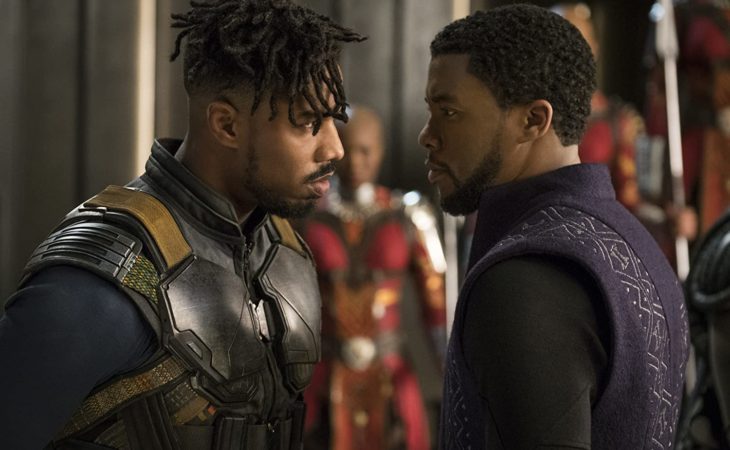
On Sunday night, ABC aired Disney/Marvel’s 2018 film, Black Panther, in honor of the legacy of the now-late Chadwick Boseman. The film stars Boseman as T’Challa, king of the small, fictional African country, Wakanda. Wakanda is an Atlantis-like country hidden to the outside world but full of wealth and technological advancement due to the extremely valuable metal Vibranium (also fictional). The start of the film explains the back history of Wakanda and jumps us to 1992 in Oakland, CA, when King T’Chaka (T’Challa’s father) accuses his brother N’Jobu of aiding and abetting a foreign arms dealer by acquiring Vibranium. This is a big no-no for the very secretive nation of Wakanda. King T’Chaka demands that N’Jobu return to Wakanda and the viewer sees a highly advanced jet leaving the apartment complex with the frame on a young boy. As is implied in the film, that boy becomes the antagonist of the story, Erik Killmonger (a nickname), played by Michael B. Jordan. Killmonger is raised fatherless (for reasons the film discloses later on), but honors his father’s legacy by embracing the ideals and philosophy he had been taught and learned from his father’s journal.
The ideals and philosophy of Killmonger are a mixed bag. He is rightly justified at the social and economic injustices African Americans have dealt with over the course of American history. He believes Wakanda should share its wealth and technological advancements with the world … but only people whose ancestry come from the African continent.
Y’all sittin’ up here comfortable. Must feel good. It’s about two billion people all over the world that looks like us. But their lives are a lot harder. Wakanda has the tools to liberate ’em all.
You know, where I’m from… when black folks started revolutions, they never had the firepower… or the resources to fight their oppressors. Where was Wakanda? Hmm? Yeah, all that ends today. We got spies embedded in every nation on Earth. Already in place. I know how colonizers think. So we’re gonna use their own strategy against ’em.
Killmonger’s love for justice becomes anger and hatred for anybody who stands in his way. His tribalism perpetuates the cycles he claims to oppose. This is stated explicitly by the protagonist:
T’Challa : You want to see us become just like the people you hate so much! Divide and conquer, just as they did!
Erik Killmonger : Nah, I learned from my enemies! Beat them at their own game!
T’Challa : You have become them!
And so it is, the oppressed seeks to become the oppressor.
Killmonger’s views are not unlike those asserted by Critical Race Theorists (CRT) today. There is some debate over how to describe CRT, but Neil Shenvi has a list of scholars and their descriptions. CRT in its most basic description is the critical look into society, investigating who are the oppressed and who are the oppressors, based upon race. In most of the descriptions Shenvi provides, you can hear Killmonger’s perspective. There are the oppressed minorities groups and the oppressors (white people). There is a robust sense of racial identity (not national, but racial); this differentiates T’Challa and the representative Wakandan position from Killmonger’s view. Whiteness, the culture of the oppressive group, is assumed to be perpetuated in the hegemony of the white world over Wakanda (i.e, Wakanda itself is subservient to the oppressive white group). Many of the core positions of CRT like the ones described above are found in Killmonger’s philosophy, and thankfully the film has placed these values as villainous and destructive, because they are!
The African-centric film depicts different perspectives on racial issues through four characters: 1. Killmonger (described above) 2. Ulysses Klaw (Andy Serkis) is the unstated white supremacist (stealing from black people the value that rightfully belongs to them) 3. CIA agent Everrett Ross (Martin Freeman) represents the everyday white man (ignorant of Wakandan customs and values, yet willing to fight for their existence). 4. Finally, T’Challa represents the Wakandan view: What has been hidden ought to be shared, because it is of value to all people.
Wakandans know how to be relational bridge builders, people who recognize social and economic injustices but find constructive ways to correct them such as economic free trade and educational outreach centers; let’s be more like T’Challa and agent Ross. Critical Race Theory won’t ever bring unity or build equality, it simply reverses who are the oppressors and who are the oppressed. It is destructive, seeking to up-end social institutions altogether; it is like Killmonger unknowingly seeking to become like Klaw. Both have a hatred of races, both seek power and authority. If you support the Black Panther superhero, then you should reject Critical Race Theory.
Like this content and want to see more? Support this writing ministry by becoming a monthly sustaining steward today.

Comments